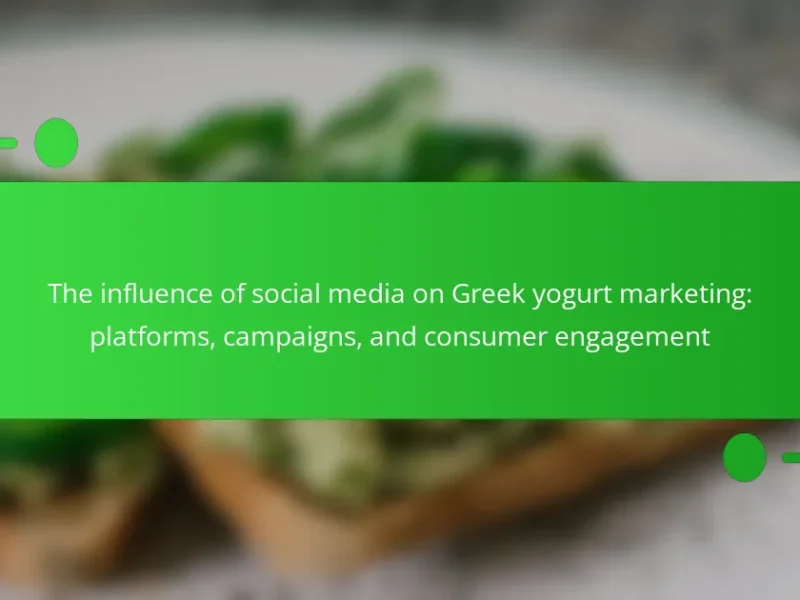The article examines the impact of advertising on Greek yogurt sales, highlighting the effectiveness of various messaging strategies, advertising channels, and target demographics. It details how advertising can elevate brand awareness and consumer interest, with research indicating that targeted campaigns can increase sales by up to 30%. Key advertising channels such as social media and in-store promotions are identified as particularly effective, especially for engaging health-conscious consumers aged 18 to 34. The article also discusses the significance of influencer marketing and promotions in driving immediate purchasing decisions, emphasizing the importance of strategic advertising in fostering market growth for Greek yogurt.

What is the impact of advertising on Greek yogurt sales?
Advertising significantly increases Greek yogurt sales. Effective advertising raises brand awareness and consumer interest. Research shows that targeted campaigns can boost sales by up to 30%. Advertising through social media engages younger demographics effectively. Television ads reach a broader audience and enhance product visibility. Promotions and discounts featured in ads drive immediate purchasing decisions. Seasonal advertising campaigns create urgency and increase sales during specific periods. Overall, strategic advertising is crucial for maximizing Greek yogurt market growth.
How does advertising influence consumer purchasing decisions for Greek yogurt?
Advertising significantly influences consumer purchasing decisions for Greek yogurt. It shapes consumer perceptions and preferences through targeted messaging. Effective advertising highlights health benefits, such as high protein content and probiotics. This information appeals to health-conscious consumers.
Moreover, advertising channels like social media reach younger demographics effectively. Studies show that visual marketing increases brand recognition and purchase intent. For instance, a Nielsen report indicates that 60% of consumers are more likely to buy a product after seeing it advertised.
Additionally, endorsements from influencers enhance credibility. Consumers often trust recommendations from figures they follow. This trust can lead to increased sales for Greek yogurt brands. Overall, advertising plays a crucial role in driving consumer choices in the Greek yogurt market.
What psychological factors are affected by advertising in Greek yogurt marketing?
Advertising in Greek yogurt marketing affects several psychological factors. These factors include brand perception, consumer trust, and emotional appeal. Advertisements often create a positive brand image through appealing visuals and messaging. This enhances consumer trust in the product. Emotional appeals, such as health benefits or lifestyle alignment, influence purchasing decisions. Research shows that emotional connections can increase brand loyalty. For example, a study by Goh et al. (2020) highlights how emotional advertising boosts consumer engagement and preference. Overall, advertising effectively shapes psychological factors that drive Greek yogurt sales.
How do consumer perceptions of Greek yogurt change due to advertising?
Consumer perceptions of Greek yogurt change significantly due to advertising. Advertising influences beliefs about health benefits, taste, and quality. For instance, campaigns that emphasize protein content often lead consumers to view Greek yogurt as a healthier choice. Studies show that exposure to positive advertising increases purchase intent by up to 30%. Additionally, targeted ads can shift perceptions among specific demographics, such as health-conscious individuals. A survey by the International Dairy Foods Association found that 70% of consumers associate Greek yogurt with a nutritious lifestyle due to effective marketing. This indicates that advertising plays a crucial role in shaping consumer attitudes and behaviors towards Greek yogurt.
What types of advertising messages are most effective for Greek yogurt?
Health-focused advertising messages are most effective for Greek yogurt. These messages highlight the nutritional benefits, such as high protein content and probiotics. Studies show that consumers are increasingly health-conscious. They prefer products that promote wellness and healthy living. Messaging that emphasizes low calories and fat can also attract health-oriented buyers. Additionally, showcasing versatility in recipes appeals to consumers’ desire for convenience. Brands that use testimonials or endorsements from nutritionists enhance credibility. Research from the Journal of Nutrition Education and Behavior supports these findings, indicating that health claims significantly influence purchasing decisions.
What key messages resonate with health-conscious consumers?
Health-conscious consumers resonate with messages emphasizing nutritional benefits and ingredient transparency. They prefer products that highlight low sugar content and high protein levels. Claims of probiotics and digestive health also appeal to this demographic. Sustainability and ethical sourcing are increasingly important as well. Research shows that 70% of health-conscious shoppers look for clean labels. They appreciate brands that communicate their health benefits clearly and effectively. Messages about weight management and overall wellness further enhance appeal. These factors drive purchasing decisions in the health-focused market segment.
How do promotional offers impact the perception of Greek yogurt value?
Promotional offers significantly enhance the perceived value of Greek yogurt. Discounts and special deals create a sense of urgency for consumers. This urgency often leads to increased purchase intention. Research shows that price promotions can elevate product attractiveness. A study by the Journal of Marketing Research found that consumers associate discounts with higher quality. This perception can enhance brand loyalty. Furthermore, promotional offers can differentiate Greek yogurt in a competitive market. They encourage trial among new customers. Overall, promotional offers positively influence consumer perception of Greek yogurt’s value.

Which advertising channels are most effective for Greek yogurt sales?
Social media and in-store promotions are the most effective advertising channels for Greek yogurt sales. Social media platforms like Instagram and Facebook engage health-conscious consumers effectively. They allow brands to showcase recipes and health benefits. In-store promotions, including discounts and sampling events, drive immediate purchases. Nielsen reports that 70% of consumers are influenced by in-store promotions. Additionally, influencer marketing on social media enhances brand credibility. This combination of channels maximizes reach and conversion rates for Greek yogurt brands.
How do traditional media channels compare to digital channels for Greek yogurt advertising?
Traditional media channels offer broader reach but less targeting compared to digital channels for Greek yogurt advertising. Traditional media includes TV, radio, and print. These channels can reach large audiences quickly. However, they lack precise targeting capabilities. Digital channels encompass social media, websites, and email marketing. These platforms allow for targeted advertising based on user behavior and preferences.
Research indicates that digital advertising can yield higher engagement rates. A study by eMarketer found that digital ad spending surpassed traditional media in 2020. Additionally, digital channels enable real-time performance tracking and adjustments. This flexibility enhances campaign effectiveness. In contrast, traditional media often requires longer lead times for ad placements.
Overall, digital channels provide better targeting and measurable results. Traditional media, while effective for brand awareness, may not convert as efficiently. Thus, a combined approach may optimize Greek yogurt advertising strategies.
What role does social media play in promoting Greek yogurt brands?
Social media plays a crucial role in promoting Greek yogurt brands by enhancing visibility and engagement. Brands utilize platforms like Instagram and Facebook to showcase their products visually. This approach attracts health-conscious consumers who seek nutritious options. Engaging content, such as recipes and health tips, encourages user interaction. Additionally, social media influencers promote Greek yogurt, amplifying brand reach. Research indicates that 70% of consumers trust brand recommendations from influencers. Targeted advertising on social media allows brands to reach specific demographics effectively. This strategy drives higher sales and brand loyalty among consumers.
How effective are influencer partnerships in Greek yogurt marketing?
Influencer partnerships are highly effective in Greek yogurt marketing. They leverage the influencer’s established trust and reach within their audience. This strategy can lead to increased brand awareness and consumer engagement. Research shows that influencer marketing can yield an ROI of $5.78 for every dollar spent. Influencers often create authentic content that resonates with their followers. This authenticity drives higher conversion rates compared to traditional advertising. A study by the Digital Marketing Institute found that 49% of consumers depend on influencer recommendations. Therefore, influencer partnerships significantly enhance Greek yogurt marketing efforts.
What are the emerging trends in advertising channels for Greek yogurt?
Emerging trends in advertising channels for Greek yogurt include increased digital marketing and influencer partnerships. Brands are shifting focus to social media platforms for targeted advertising. This approach allows for direct engagement with health-conscious consumers. Video content, particularly on platforms like Instagram and TikTok, is gaining popularity. Short, engaging videos showcase recipes and health benefits of Greek yogurt. Additionally, personalized marketing through data analytics is becoming more prevalent. Brands increasingly tailor messages based on consumer preferences and behaviors. Sustainability messaging is also on the rise, appealing to environmentally conscious shoppers. Overall, these trends reflect a move towards more interactive and personalized advertising strategies.
How are mobile ads changing the landscape of Greek yogurt marketing?
Mobile ads are transforming Greek yogurt marketing by enabling targeted and personalized messaging. Advertisers can reach consumers based on their preferences and behaviors. This precision increases engagement and conversion rates. For example, mobile ads can promote new flavors or health benefits directly to health-conscious consumers. Data from eMarketer indicates that mobile ad spending in the food and beverage sector is growing rapidly. This trend highlights the importance of mobile platforms for brands. Furthermore, mobile ads facilitate real-time promotions and offers, enhancing consumer interaction. As a result, Greek yogurt brands can adapt their strategies quickly to market demands. Overall, mobile advertising is reshaping how Greek yogurt is marketed to consumers.
What impact does video advertising have on Greek yogurt brand awareness?
Video advertising significantly enhances Greek yogurt brand awareness. It captures consumer attention effectively through visual storytelling. Engaging content in video ads can lead to better recall of brand names. Research shows that 70% of consumers remember video ads they have watched. Furthermore, video advertising allows brands to showcase product benefits dynamically. This format fosters emotional connections with the audience. As a result, brands often see increased recognition and preference in the marketplace. Studies indicate that video ads can increase brand awareness by up to 80%.

Who are the target demographics for Greek yogurt advertising?
The target demographics for Greek yogurt advertising primarily include health-conscious consumers. This group often consists of young adults aged 18 to 34 who prioritize nutrition. Women are a significant segment within this demographic, often seeking high-protein, low-calorie options. Families with children also target Greek yogurt for its nutritional benefits. Additionally, fitness enthusiasts are drawn to Greek yogurt for its protein content and versatility in diets. Market research indicates that consumers are increasingly aware of the health benefits of Greek yogurt, further driving its popularity among these demographics.
What age groups are most likely to purchase Greek yogurt?
Adults aged 25 to 34 are the most likely to purchase Greek yogurt. This age group shows a strong preference for healthier food options. According to a 2021 survey by the International Dairy Foods Association, 57% of consumers in this demographic reported buying Greek yogurt regularly. Additionally, individuals aged 18 to 24 also demonstrate significant purchasing behavior, with 45% indicating they buy Greek yogurt. The trend continues with consumers aged 35 to 44, where 40% reported similar purchasing habits. These statistics highlight the popularity of Greek yogurt among younger adults, driven by health trends and dietary preferences.
How do lifestyle choices influence the target demographics for Greek yogurt?
Lifestyle choices significantly influence the target demographics for Greek yogurt. Health-conscious consumers often prioritize high-protein and low-fat options. These individuals typically belong to age groups ranging from young adults to middle-aged individuals. Many of these consumers engage in regular exercise and seek nutritious snacks. The trend towards plant-based diets also affects yogurt consumption patterns. Additionally, people following specific diets, like keto or paleo, are drawn to Greek yogurt for its nutritional profile. Studies show that 60% of yogurt consumers are motivated by health benefits. This data underscores the connection between lifestyle choices and Greek yogurt’s appeal to specific demographics.
What are the key characteristics of the health-conscious consumer demographic?
Health-conscious consumers prioritize nutrition and wellness in their purchasing decisions. They often seek products with natural ingredients and minimal processing. This demographic typically reads labels carefully for nutritional information and ingredient lists. Many health-conscious consumers are willing to pay a premium for organic or health-focused products. They frequently engage in regular physical activity and maintain a balanced diet. Research indicates that this group is increasingly influenced by social media and wellness trends. According to a 2021 survey by Statista, 66% of consumers reported health as a top factor in food choices. Additionally, they value transparency from brands regarding sourcing and production practices.
How does the income level affect Greek yogurt purchasing behavior?
Income level significantly influences Greek yogurt purchasing behavior. Higher income consumers tend to purchase premium Greek yogurt brands. They prioritize quality, health benefits, and organic options. Lower income consumers often opt for more affordable brands. Price sensitivity affects their choices, leading to lower overall consumption. Research indicates that households with higher incomes spend more on dairy products, including Greek yogurt. A study by the USDA found that income correlates with increased dairy expenditure. This trend highlights the relationship between income and purchasing preferences in the yogurt market.
What role does education play in the consumption of Greek yogurt?
Education influences the consumption of Greek yogurt by increasing awareness of its health benefits. Consumers with higher education levels are more likely to understand nutritional information. This understanding leads to informed choices regarding dietary options. Research indicates that educated individuals prioritize protein-rich foods like Greek yogurt. Studies show that consumers with knowledge about probiotics are more inclined to purchase yogurt products. Furthermore, educational campaigns can effectively promote Greek yogurt’s advantages. Overall, education shapes consumer preferences and enhances Greek yogurt consumption.
What strategies can marketers use to effectively reach target demographics for Greek yogurt?
Marketers can effectively reach target demographics for Greek yogurt by utilizing targeted digital advertising. This includes social media platforms like Instagram and Facebook, where health-conscious consumers frequently engage. Influencer partnerships can amplify brand messages by leveraging trusted figures in the health and wellness space. Content marketing that focuses on recipes and health benefits can attract interest from potential buyers. Email marketing campaigns can also be tailored to specific demographics, providing personalized offers and information. Research indicates that 77% of consumers prefer brands that engage them through personalized marketing. Additionally, in-store promotions and sampling can directly influence purchasing decisions at the point of sale.
How can brands tailor their messaging to resonate with specific demographics?
Brands can tailor their messaging by understanding the unique preferences and values of specific demographics. This involves conducting market research to gather data on consumer behavior and preferences. For example, younger consumers may prioritize health benefits and convenience. In contrast, older demographics might focus on quality and traditional values.
Using targeted language and imagery that resonates with these groups is essential. Brands should also consider cultural references that appeal to their target audience. Personalized marketing campaigns can enhance engagement and connection.
Statistics show that personalized messaging can increase response rates by up to 50%. This demonstrates the effectiveness of tailored communication in driving sales. Brands that align their messaging with demographic insights are more likely to succeed in competitive markets.
What are best practices for advertising Greek yogurt to diverse consumer segments?
Best practices for advertising Greek yogurt to diverse consumer segments include tailoring messaging to specific demographics. Understanding cultural preferences is crucial. For instance, health-conscious consumers may respond well to messages highlighting nutritional benefits. In contrast, families might appreciate convenient recipes featuring Greek yogurt.
Utilizing various advertising channels is essential. Social media platforms can effectively reach younger audiences, while traditional media may better engage older demographics. Influencer partnerships can also enhance credibility among specific groups.
Promoting versatility is another effective strategy. Showcasing Greek yogurt in different culinary contexts appeals to a broader audience. Highlighting unique attributes, such as high protein content, can differentiate products in a crowded market.
Finally, conducting market research helps identify the preferences of diverse consumer segments. This data-driven approach ensures that advertising strategies resonate with target audiences.
The main entity of this article is Greek yogurt, specifically examining the impact of advertising on its sales. The article outlines how effective advertising strategies, including targeted messaging and various channels such as social media and traditional media, significantly influence consumer purchasing decisions and perceptions of Greek yogurt. It discusses the psychological factors affected by advertising, the effectiveness of health-focused messaging, and the role of promotional offers in enhancing perceived value. Additionally, the article identifies key target demographics and provides best practices for marketers to effectively reach diverse consumer segments.


